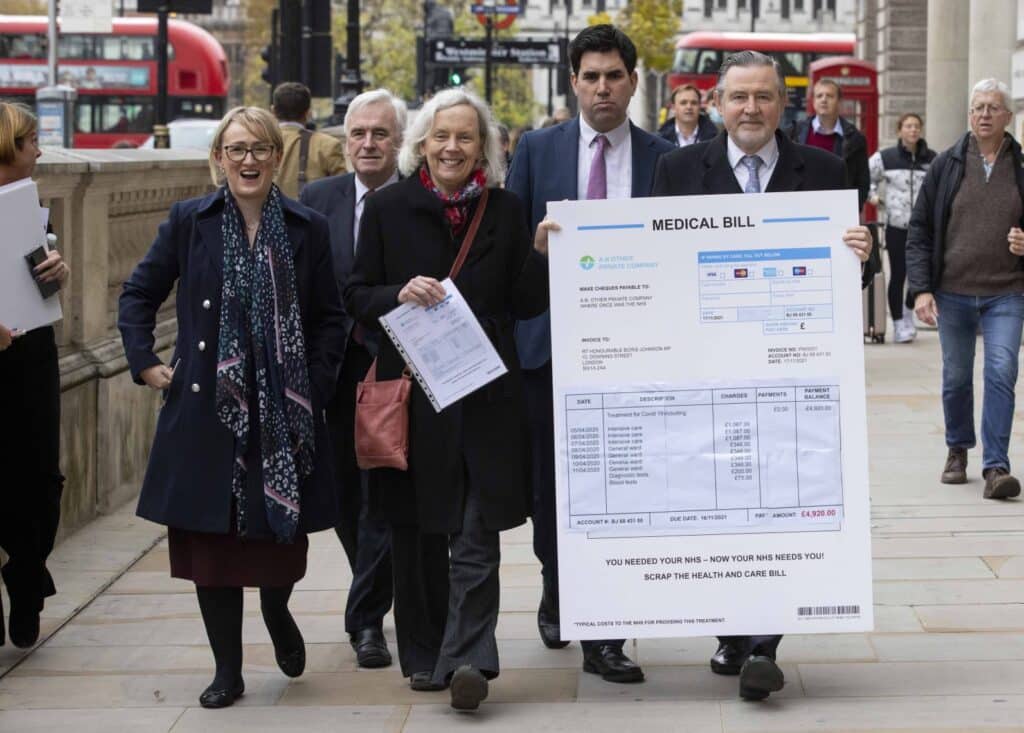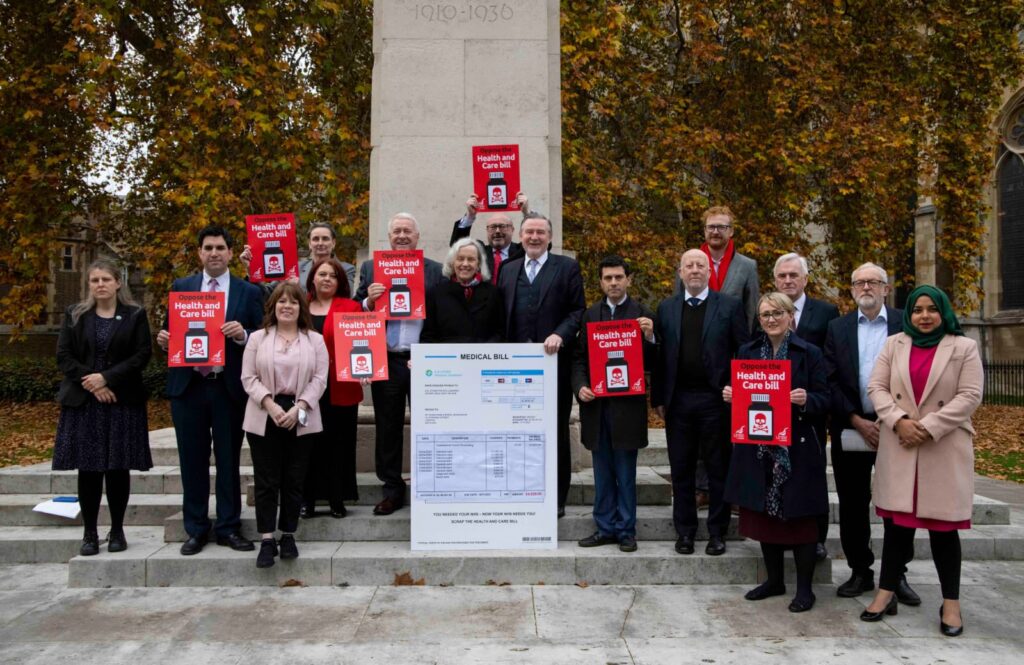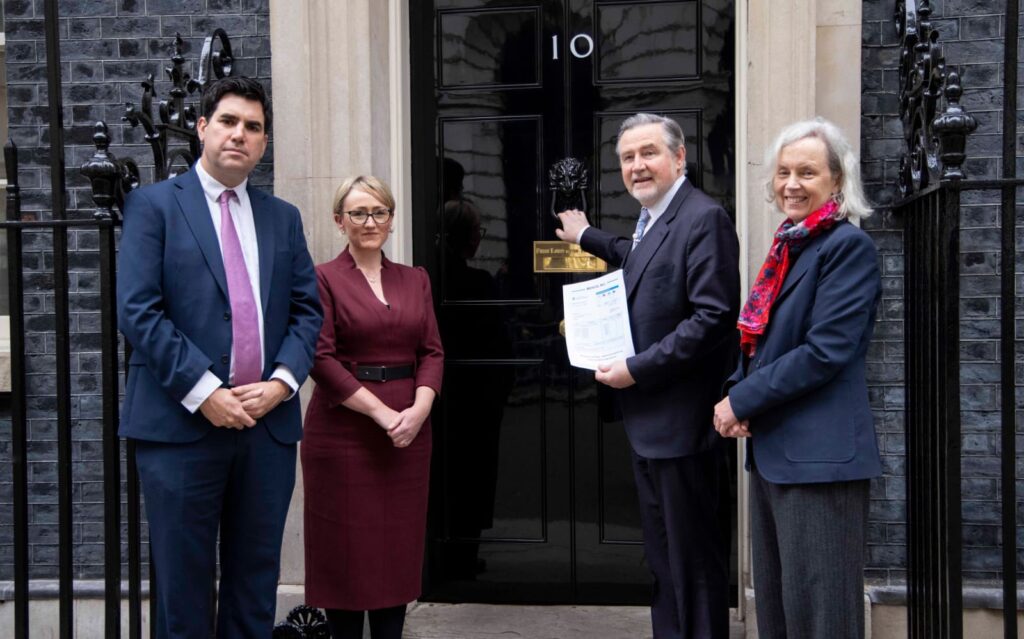Today at No.10 I presented an “invoice” for the PM’s hospital treatment. Soon we could all be seeing invoices like this.
The Health & Care Bill will give commissioning power to big US companies & drive health rationing to force people into Private health care. (Barry Gardiner)



Will the Bill lead to greater involvement of the private sector in delivering and planning clinical services? The Kings Fund responds:
Independent sector organisations have long played a role in delivering health care services within the NHS, with services such as dentistry, optical care and community pharmacy being provided by the private sector for decades, and most GP practices are private partnerships.
It was argued that the Health and Social Care Act 2012 would lead to an increase in the number of contracts awarded to private providers. However, there is no evidence that, even within the competitive framework established by the 2012 Act, widespread privatisation of services has taken place over recent years.
Despite this, critics of the current Bill fear that private sector involvement in delivering clinical services will increase due to changes to procurement rules, the ability for private providers to hold seats on integrated care boards (ICBs) and potential conflict of interests in the awarding of contracts.
The changes to how clinical services are procured sit within a wider package of reforms that aims to place collaboration, rather than competition, at the heart of how health care services are organised. Yet there are concerns that these changes, particularly where new services are being commissioned or services are being substantially changed, would allow contracts to be awarded to new providers without sufficient scrutiny, opening the door to private providers. In practice, though, the changes are framed by a duty on commissioners to act in the best interests of patients, taxpayers and their local populations, and will be informed by a new NHS provider selection regime, which is being developed by NHS England to support commissioning organisations and will include safeguards such as transparency expectations.
A greater risk of the changes to competitive tendering is that existing contracts are regularly rolled over to the incumbent provider, with little opportunity for alternative providers to come forward. We have argued that there should be measures to mitigate this risk and encourage a diversity of providers, including voluntary and community sector (VCS) organisations, which play a vital role in delivering health and care services.
There has also been concern expressed about the potential for private providers to hold seats on ICBs, the main local planning and funding body for NHS services. The legislation does allow ICBs to choose their own members, and therefore, where major local services – for example, community health services – are run by a private company, that company may be invited to be a member. However, the same is true if a major service was delivered by a VCS organisation.
The Bill mandates that ICB members must include representation from local NHS providers, primary care services, local authorities and independent non-executive directors and all such members will potentially be involved in procurement decisions about clinical services. Crucially, the ICB model proposes that decisions about who delivers services are informed by a blend of perspectives, although there is a risk that one or two perspectives dominate. It is right, therefore, that the Bill includes safeguards, for example, decisions of the board and its committees must be made transparently with meetings in public and papers published. Overall, it is unlikely that the changes in the Bill will result in a substantial change in the private sector’s involvement in delivering NHS services.
Those on the GP frontline say:
GPonline reported earlier this year that Operose Health – a subsidiary of US healthcare giant the Centene Corporation – now holds around 1% of GP practice contracts in England, making it the country’s largest provider of NHS primary care with around half a million patients.
Operose Health expanded its portfolio of NHS GP practices to 58 through a ‘partnership’ with major primary care provider AT Medics earlier this year.
The expansion of Centene’s foothold in NHS primary care has sparked concern among GPs, with the Doctors in Unite union warning the health service was being ‘parcelled up and sold off under the radar’.
GP practices
Leading a protest outside the London headquarters of Operose on 22 April, east London GP and Doctors in Unite chair Dr Jackie Applebee said a ‘huge swathe’ of English general practice had been handed over to a US-backed company – and called for greater ‘transparency and openness’.
She hit out at comments earlier this year from health and social care secretary Matt Hancock that all GP practices were ‘private companies’.
‘This is disingenuous and [the government] know it,’ said Dr Applebee. ‘There is a world of difference between a multinational corporation that operates to make a profit and local GPs who are very much part of the NHS “family” and provide services from a budget fixed by the Treasury.
‘The public needs to wake-up to the fact the NHS that they so value and which has been the lynchpin of the successful COVID-19 vaccination programme is being steadily sold off.
NHS principles
‘This is another prime example of the accelerating privatisation of the NHS by stealth. Now is a time to draw a line in the sand to preserve and cherish the NHS as an organisation free at the point of delivery to all those in need. If we are not vigilant, these founding principles of the NHS in 1948 will become pale shadows of themselves.’
Protesters were joined by Poplar and Limehouse MP Apsana Begum and Islington North MP and former Labour leader Jeremy Corbyn. Ms Begum told the protest that outsourcing to the private sector must be ended.
An Operose Health spokesperson said: ‘Operose Health shares NHS values, provides NHS services and cares for NHS patients. Like other NHS providers, our care is free at the point of delivery, regulated and inspected by the CQC.
‘We focus on delivering personal, professional patient care, of the highest quality, to the populations we serve. We are committed to widening public access to excellent patient care, especially in the most deprived communities, experiencing the most profound health inequalities.’
The Labour party called earlier this year for the government to halt the ‘stealth privatisation’ of NHS GP practices.
Sources:
https://www.kingsfund.org.uk/about-us
If you like our content please keep us going for as little as £2 a month https://dorseteye.com/donate/








THE TORY REGIME IS USING CV FLU WITH A 98% SURVIVAL RATE/2% DEATH RATE TO DENY BRITISH PEOPLE HEALTH SERVICES 100%. They have been at this dismantling process since 1993